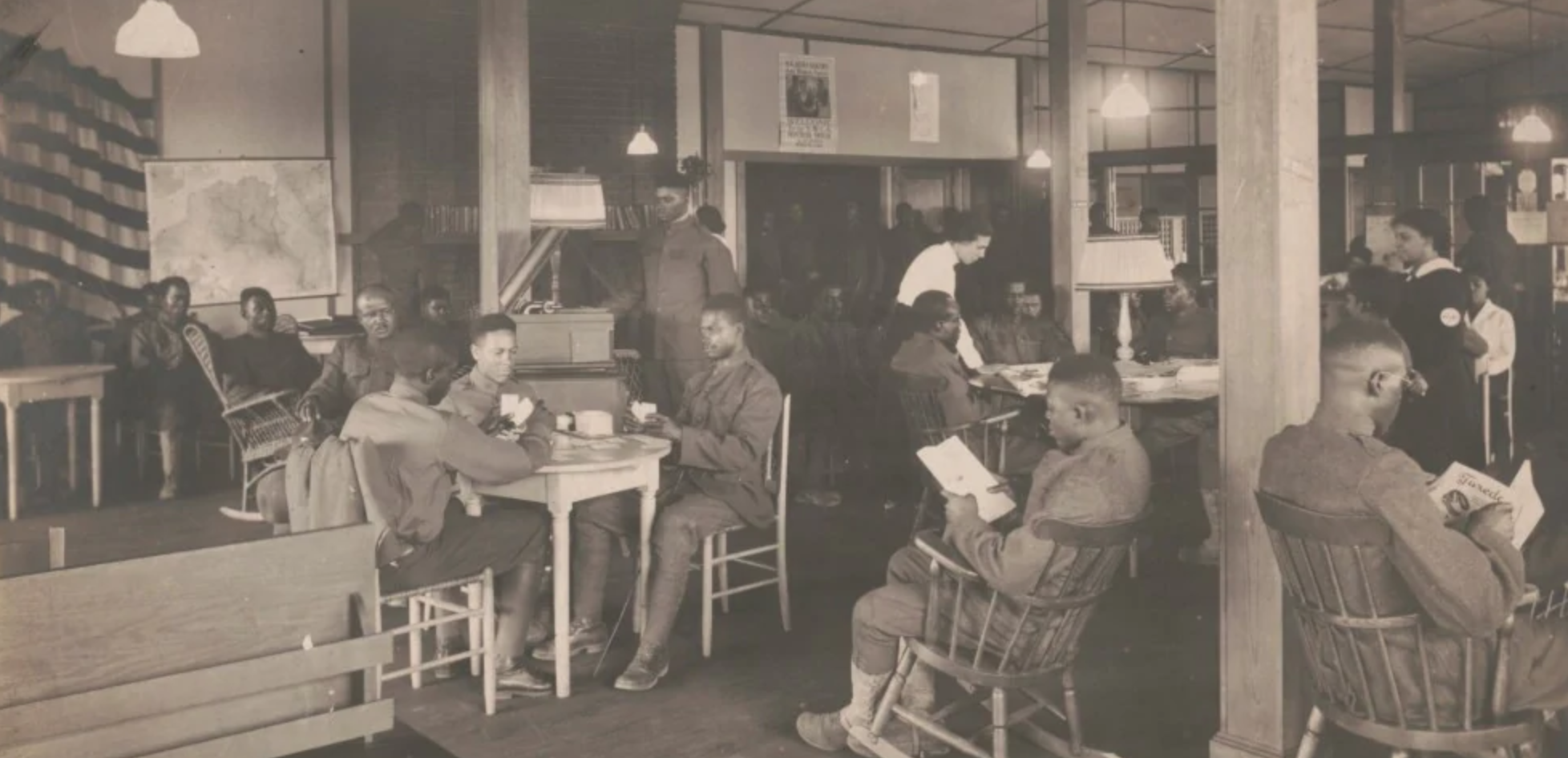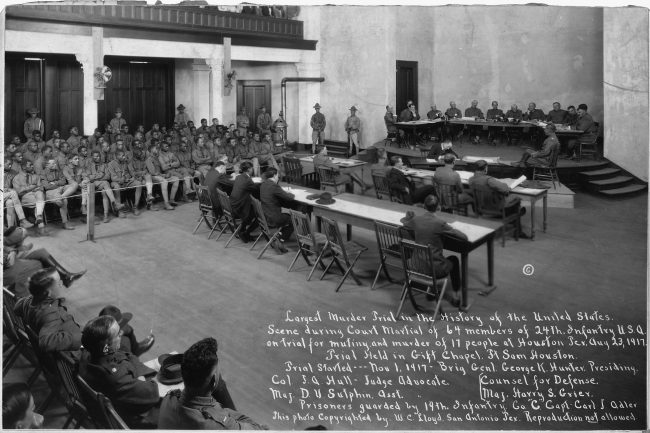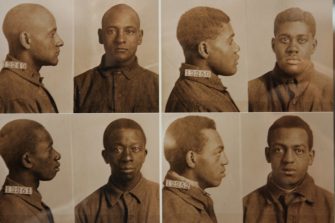JAKE COYLE
Associated Press Aug 17, 2020,

View photos
This image released by Vertical Entertainment shows Trai Byers, center, in a scene from "The 24th." (Vertical Entertainment via AP)More

NEW YORK (AP) — The sole photograph related to the Houston Riot of 1917 shows 64 Black soldiers sitting with arms folded and legs crossed behind a rope. Their sheer number, in a courtroom otherwise populated by white men, suggests they’re part of the audience but they’re not. They’re the defendants in what’s considered the largest murder trial in American history.
When the writer-director Kevin Willmott first came upon the photo 30 years ago, he was mystified by it. What was the story behind it? And how had he never heard of the Houston Riot before?
That led, ultimately, to “The 24th, ” Willmott’s dramatization of one of the bloodiest and most tragic chapters in the dark history of Jim Crow America.
When the writer-director Kevin Willmott first came upon the photo 30 years ago, he was mystified by it. What was the story behind it? And how had he never heard of the Houston Riot before?
That led, ultimately, to “The 24th, ” Willmott’s dramatization of one of the bloodiest and most tragic chapters in the dark history of Jim Crow America.
Shortly after the U.S. entered World War I, 156 soldiers in an all-Black regiment, the 24th, were stationed near Houston. After beatings and harassment by locals and police officers -- including the dragging of a Black woman from her home that led to an attack and the arrest of a Black soldier -- the infantrymen mutinied and marched on Houston. Some 21 died in the violence including 11 civilians. After the trial, 19 of the soldiers were hung; 41 were sentenced to life imprisonment.
In a time of reckoning for police brutality, “The 24th” reverberates with injustices past and present. By stretching back more than 100 years, it vividly captures an early example of unrest unleashed by racist policing. Such incidents have typically gone unmentioned in history books. Willmott calls it “a hidden history.”
“Black people have been complaining, shouting, screaming, crying about police abuse for a long, long, long time,” Willmott said in a recent interview. “The movie is really an indictment for how long this problem has existed in the country.”
“The 24th” had originally been slated to premiere in March at SXSW before the coronavirus pandemic canceled the festival. But it’s one of the few films that have managed to find a path forward nevertheless. On Friday, Vertical Entertainment will release it on-demand and in digital rental, two days before the anniversary of the Houston Riot, also called the Camp Logan Mutiny.
Willmott is best known as Spike Lee’s recent co-writer. He helped pen “Chi-Raq,” “BlacKkKlansman” and their recent Netflix release, “Da 5 Bloods.” He also teaches film at the University of Kansas; the star and co-writer of “The 24th,” Trai Byers (“Empire”), was once Willmott’s screenwriting student.
While Willmott was working on “BlacKkKlansman” -- which won him and Lee an Oscar -- he suggested Byers look over the script. Together, they believed the film had the power to educate.
“It’s history. That was our main point. This is history. History that hasn’t been taught,” Byers said. “In order to meet these moments, we need that history, we need that point of reference. Until we know where we’ve been, how can we know who we are?”
While the horrors of slavery have sometimes been depicted in film, the in-between decades of Jim Crow have more seldom been shown. That could be changing. The opening of HBO’s “Watchmen,” set amid the Tulsa Race Massacre of 1921 -- in which white mobs leveled 35 square blocks of the wealthy Black Oklahoma community known as “Black Wall Street” -- exposed many to a history they knew little about.
“People need to know about the period after slavery. Slavery is the real sin of American life, but it didn’t end after slavery,” says Willmott. “That period after slavery, from the 1880s to the 1930s is for African Americans literally almost a Holocaust. That part of our history was really just erased from history books. Black people don’t know it, white people don’t know it. The fact that you can wipe out a whole black section of town in Tulsa -- that’s like a 9/11 for Black people -- and no one knows about it.”
With Lee, Willmott has been digging into less well-known periods of African American history, tugging at the roots of white supremacy ("BlacKkKlansman") and the nature of patriotism for Black Americans ("Da Five Bloods"). More often than not, they’re finding their films even more relevant than they expected.
“My Brother Kevin Willmott Has The Directing And Writing Skills That Show Us The Stories That Need To Be Seen And Heard,” Lee said in an email.
The obvious timeliness of “The 24th” was one reason its makers wanted it to come out this summer, even if movie theaters are largely closed due to the coronavirus. Descendants of three of the hanged men from the Houston Riot — William Nesbit, Thomas Coleman Hawkins and Jesse Ball Moore — recently petitioned the White House for posthumous pardons.
“It’s almost like we’re dealing with the George Floyds, the Breonna Taylors, the Ahmaud Arberys from a fresh take. But it’s not a fresh take. There’s so many tales of what happens when you push a man too far, push a group of people too far," says Byers. “What we’re hoping is that this film sparks the curiosity of the nation to find other stories.”
Getting “The 24th” made 30 years ago, Willmott says, was unfathomable. It wasn’t easy in 2019 either. The filmmakers didn’t find a home with a major studio or a streaming company but got it made with Jordan Fudge and the socially minded media fund New Slate Ventures. Since then, Willmott believes the death of George Floyd has “changed everything,” including the movie industry. Floyd grew up in Houston.
“I have a saying,” says Willmott. “We don’t own history, history owns us.”
___
Follow AP Film Writer Jake Coyle on Twitter at: http://twitter.com/jakecoyleA
Dec. 11, 1917: Black Soldiers Executed for Houston Riot
The primary cause of the Houston riot was the habitual brutality of the white police officers of Houston in their treatment of colored people. —The Crisis Magazine, November 1917

BOOKS: NON-FICTION
The Port Chicago 50: Disaster, Mutiny, and the Fight for Civil Rights
Book – Non-fiction. By Steve Sheinkin. 2014.
The story of 50 African American sailors charged with mutiny during World War II for challenging working conditions after a deadly munitions explosion.

TEACHING GUIDES
Teaching for Black Lives
Teaching Guide. Edited by Dyan Watson, Jesse Hagopian, Wayne Au. 368 pages. 2018. Rethinking Schools.
Essays, teaching activities, role plays, poems, and artwork, designed to illuminate the movement for Black students’ lives, the school-to-prison-pipeline, Black history, gentrification, intersectional Black identities, and more.
Click to email this to a friend (Opens in new window)
Click to share on Pinterest (Opens in new window)
Click to share on Twitter (Opens in new window)
Click to share on Facebook (Opens in new window)

THIS DAY IN HISTORY
July 19, 1919: White Mobs in Uniform Attack African Americans — Who Fight Back — in Washington, D.C.
White mobs, incited by the media, attacked the African American community in Washington, D.C., and African American soldiers returning from WWI. This was one of the many violent events that summer and it was distinguished by strong and organized Black resistance to the white violence.
“Black people have been complaining, shouting, screaming, crying about police abuse for a long, long, long time,” Willmott said in a recent interview. “The movie is really an indictment for how long this problem has existed in the country.”
“The 24th” had originally been slated to premiere in March at SXSW before the coronavirus pandemic canceled the festival. But it’s one of the few films that have managed to find a path forward nevertheless. On Friday, Vertical Entertainment will release it on-demand and in digital rental, two days before the anniversary of the Houston Riot, also called the Camp Logan Mutiny.
Willmott is best known as Spike Lee’s recent co-writer. He helped pen “Chi-Raq,” “BlacKkKlansman” and their recent Netflix release, “Da 5 Bloods.” He also teaches film at the University of Kansas; the star and co-writer of “The 24th,” Trai Byers (“Empire”), was once Willmott’s screenwriting student.
While Willmott was working on “BlacKkKlansman” -- which won him and Lee an Oscar -- he suggested Byers look over the script. Together, they believed the film had the power to educate.
“It’s history. That was our main point. This is history. History that hasn’t been taught,” Byers said. “In order to meet these moments, we need that history, we need that point of reference. Until we know where we’ve been, how can we know who we are?”
While the horrors of slavery have sometimes been depicted in film, the in-between decades of Jim Crow have more seldom been shown. That could be changing. The opening of HBO’s “Watchmen,” set amid the Tulsa Race Massacre of 1921 -- in which white mobs leveled 35 square blocks of the wealthy Black Oklahoma community known as “Black Wall Street” -- exposed many to a history they knew little about.
“People need to know about the period after slavery. Slavery is the real sin of American life, but it didn’t end after slavery,” says Willmott. “That period after slavery, from the 1880s to the 1930s is for African Americans literally almost a Holocaust. That part of our history was really just erased from history books. Black people don’t know it, white people don’t know it. The fact that you can wipe out a whole black section of town in Tulsa -- that’s like a 9/11 for Black people -- and no one knows about it.”
With Lee, Willmott has been digging into less well-known periods of African American history, tugging at the roots of white supremacy ("BlacKkKlansman") and the nature of patriotism for Black Americans ("Da Five Bloods"). More often than not, they’re finding their films even more relevant than they expected.
“My Brother Kevin Willmott Has The Directing And Writing Skills That Show Us The Stories That Need To Be Seen And Heard,” Lee said in an email.
The obvious timeliness of “The 24th” was one reason its makers wanted it to come out this summer, even if movie theaters are largely closed due to the coronavirus. Descendants of three of the hanged men from the Houston Riot — William Nesbit, Thomas Coleman Hawkins and Jesse Ball Moore — recently petitioned the White House for posthumous pardons.
“It’s almost like we’re dealing with the George Floyds, the Breonna Taylors, the Ahmaud Arberys from a fresh take. But it’s not a fresh take. There’s so many tales of what happens when you push a man too far, push a group of people too far," says Byers. “What we’re hoping is that this film sparks the curiosity of the nation to find other stories.”
Getting “The 24th” made 30 years ago, Willmott says, was unfathomable. It wasn’t easy in 2019 either. The filmmakers didn’t find a home with a major studio or a streaming company but got it made with Jordan Fudge and the socially minded media fund New Slate Ventures. Since then, Willmott believes the death of George Floyd has “changed everything,” including the movie industry. Floyd grew up in Houston.
“I have a saying,” says Willmott. “We don’t own history, history owns us.”
___
Follow AP Film Writer Jake Coyle on Twitter at: http://twitter.com/jakecoyleA
Dec. 11, 1917: Black Soldiers Executed for Houston Riot
Time Periods: World War I: 1910 - 1919
Themes: African American, Racism & Racial Identity
The primary cause of the Houston riot was the habitual brutality of the white police officers of Houston in their treatment of colored people. —The Crisis Magazine, November 1917

Houston Riot court martial, August 23, 1917. Source: National Archives and Records Administration. Click for caption transcription and more info.
On Dec. 11, 1917, 13 African American soldiers were hanged just outside of San Antonio for alleged participation in the Houston Riot (or Mutiny) in August. The Houston Riot was started after a case of police brutality, as described by the Paris, Texas NAACP here:
At noon [on August 23, 1917], police dragged an African American woman from her home and arrested her for public drunkenness. A soldier from the camp asked what was going on, and was beaten and arrested as well. When Cpl. Charles Baltimore, an MP, learned of the arrest he went to the police station to investigate. He was beaten, then shot at as he was chased away. Rumors soon reached the camp that Baltimore had been killed, and that a white mob was approaching. Soldiers armed themselves and began their march toward the city.
A riot ensued, leaving 16 white people dead, including five policemen. Four Black soldiers also died.
The army held three courts-martial following the Houston Riot and found 110 African Americans guilty.
Nineteen African American soldiers were executed and 63 received life sentences in federal prison. Two white officers faced court-martial, but they were released. No white civilians were brought to trial.
The 13 soldiers hanged on December 11 were:
Sgt. William C. Nesbitt
Corp. Larsen J. Brown
Corp. James Wheatley
Corp. Jesse Moore
Corp. Charles W. Baltimore
Pvt. William Brackenridge
Pvt. Thomas C. Hawkins
Pvt. Carlos Snodgrass
Pvt. Ira B. Davis
Pvt. James Divine
Pvt. Frank Johnson
Pvt. Rosley W. Young
Pvt. Pat MacWharter

Some of the soldiers who received life sentences.
Courtesy of Angela Holder and Buffalo Soldiers National Museum

Marker at site of hanging of African American soldiers in Houston.
Learn more from Executed Today and an extensive collection of primary documents on the riot and trial at the South Texas College of Law.
To put this event in historical context, we recommend Freedom Struggles: African Americans and World War I by Adriane D. Lentz-Smith and Lynching in America: Targeting Black Veterans from the Equal Justice Initiative.
Related Resources

BOOKS: NON-FICTION
The Port Chicago 50: Disaster, Mutiny, and the Fight for Civil Rights
Book – Non-fiction. By Steve Sheinkin. 2014.
The story of 50 African American sailors charged with mutiny during World War II for challenging working conditions after a deadly munitions explosion.

TEACHING GUIDES
Teaching for Black Lives
Teaching Guide. Edited by Dyan Watson, Jesse Hagopian, Wayne Au. 368 pages. 2018. Rethinking Schools.
Essays, teaching activities, role plays, poems, and artwork, designed to illuminate the movement for Black students’ lives, the school-to-prison-pipeline, Black history, gentrification, intersectional Black identities, and more.
Click to email this to a friend (Opens in new window)
Click to share on Pinterest (Opens in new window)
Click to share on Twitter (Opens in new window)
Click to share on Facebook (Opens in new window)

THIS DAY IN HISTORY
July 19, 1919: White Mobs in Uniform Attack African Americans — Who Fight Back — in Washington, D.C.
White mobs, incited by the media, attacked the African American community in Washington, D.C., and African American soldiers returning from WWI. This was one of the many violent events that summer and it was distinguished by strong and organized Black resistance to the white violence.









